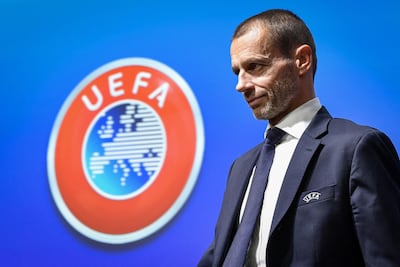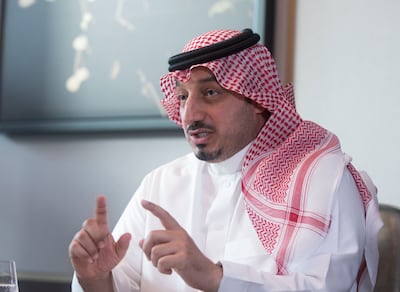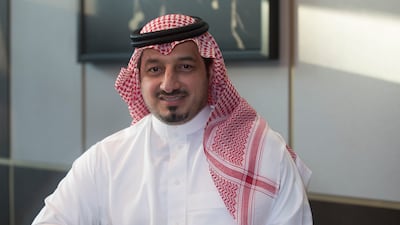The head of the Saudi Arabian Football Federation has sought to clarify its position on the proposal for the Fifa World Cup to be played every two years, saying it intended principally to open a discussion as to how the global game could move forward.
Football’s world governing body, Fifa, is currently exploring the possibility of doubling the frequency with which it stages its flagship event after a request put forward by the Saudi Arabian Football Federation (SAFF) at the Fifa Congress in May. That asked for “a feasibility study to be carried out on the impact of” holding biennial tournaments for the men’s and women’s World Cups.
At the congress, 166 of Fifa’s 211 member associations voted in favour of the study being undertaken, while on Friday the Confederation of African Football (CAF) became the first confederation to publicly approve the plan for a World Cup every two years.
Fifa will hold a global summit by videoconference on December 20 to discuss further the proposal. Former Arsenal manager Arsene Wenger, now the governing body’s head of global development, is fronting the push for a possible change.
Speaking to The National this week, the SAFF president, Yasser Al Misehal, said: “The idea of looking at a World Cup every two years is not a new idea. It was proposed by the Conmebol president [Alejandro Dominguez] back in 2018 and also by the very well-known expert Arsene Wenger in 2020.
“We thought that having almost now 100 years since the beginning of the World Cup, back in 1930, it might be a good idea to explore the opportunity to see what the impact would be if we have a World Cup every two years.
“The only thing we did from our part, as a member association at the General Assembly, was to request the Fifa Secretariat to conduct a feasibility study to see what the impact could be of having the men’s and women’s World Cup every two years. We put that to the congress, and we were surprised to see that 166 member associations voted to conduct this feasibility study.
“I saw that some people misunderstood the message and thought that we are pushing for a World Cup every two years, which is not true. We are only waiting, like the rest of the member associations, to see the final feasibility study that is already being conducted by Fifa.”
Plans for a biennial World Cup have met with stern opposition from several continental and national federations, chief among them Uefa and Conmebol. Uefa says a new schedule – the International Match Calendar is open to reform after 2024 - would adversely affect the balance between domestic, continental and international competitions.
SAFF president
Last month, Conmebol said its 10 member countries in South America made it clear they would not participate in a World Cup every two years, claiming the plan “turns its back on almost 100 years of world football tradition”.
Asked about the confederations’ opposition to the proposal, Al Misehal said: “I don't really blame them. It's their right to also protect their interests. We have a very good relationship with Uefa as well as with Conmebol. But it's too early to judge.
“But of course, listening to Uefa is very important because Uefa today have the best teams in the world and their view should be very well received. I know that CAF, at their latest congress, they supported every two years.
"But for me personally, representing the Saudi Arabian Football Federation, I can't give my yes or no before I see the final results of the whole study.”
The International Olympic Committee (IOC), meanwhile, has suggested Fifa is putting their own financial gain ahead of sport. The latter is understood to generate up to $6 million from World Cups in broadcasting and commercial deals.
Last month, the IOC said in a statement that conflicts between a biennial World Cup and other events "would undermine the diversity and development" of sports.
In reference to that, Al Misehal said: “Fifa’s not only talking to the football stakeholders; they are also talking to the non-football stakeholders. There was a discussion, or some letters exchanged, between Fifa and the IOC to sit at the table and discuss this. And I think what Fifa is doing is that they are taking into consideration what would also be the effects on other sports as well.
“I sit on the board of the Saudi Olympic Committee, so I also care about the interests of the Olympics movement. Also, we have a very good relationship with the IOC.

“So, what we really care about - and I am sure that that's what Fifa is doing - is to make sure that they have a proper discussion, because we don't want to have anything under the football umbrella which could negatively affect the other sports.
“It's going to be a bit difficult to keep everyone completely satisfied, but in the end I'm sure that whatever Fifa will do - Fifa is the 211 member associations - whatever they will decide or will do would not jeopardise any interests of the main sports stakeholders in the world.”
Al Misehal said changes in aviation, technology and climate make exploring revisions to the international match calendar more pertinent, adding that he believed having more frequent international tournaments and therefore more “meaningful” matches would benefit the game globally.
Al Misehal also said he would like to see a significant increase in youth tournaments, citing the expanding gap between Europe's top national teams and the rest of the world. The past four World Cups have been won by European sides.
“Another point is the technical level of the players,” Al Misehal said. “If you have your players playing more competitive matches with the stronger teams that will definitely increase the level. But maybe Fifa might consider another tournament and keep the World Cup every four years - that could be also another scenario.

“We feel that we need to play more competitive matches with the teams that are above our standard. That's the only way to increase the level. If we play more competitive matches, if we play against France, England, Germany, Italy a bit more frequently, that definitely will increase the level to some extent.”
Players groups and sponsors have also expressed strong concerns regarding biennial World Cups, with global players’ union FIFPRO warning footballers would face burnout and injuries from enhanced workloads.
“The welfare of the players is the [top] priority,” Al Misehal said. “By changing any structure of how you organise football or the competitions, the main thing is that it should not affect the status of the players.
"I think some of the players, especially in Europe, are playing a lot of games already, so it's not the intention to increase the number of matches, but maybe to reduce the number of the non-meaningful matches.”
Al Misehal said he “highly respected” the opinion that a World Cup every two years could diminish the value of football’s showpiece event, but that judgement of the proposal should be reserved until the feasibility study is complete.
“Fifa is doing a good job, being very professional, by consulting all the stakeholders, conducting all these meetings and listening to all the people and the views,” he said.
“So, let’s hope that it comes up with something good for the football industry and the sport industry in general. In the end, I hope that the General Assembly, and Fifa, would reach something that would really work for everyone.
“The global summit in December will also give some more insights and, hopefully by before the Fifa Congress 2022 [in March], we will have that feasibility study ready for everyone. And then everybody can give comments and take the proper decision.
“Again, we are not part of this feasibility study; we just put this proposal to conduct it. As I said, it's not a new idea, it’s not the Saudi Arabian idea. And we cannot give any comments until we see what the final results will be.
“We respect all the opinions. Of course, it will have some people who are with or against. From myself, from our side as the Saudi Arabian Football Federation, we are not for or against. And if the feasibility study says that it's better to keep it as it is, we will all support it.”


